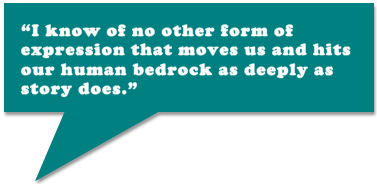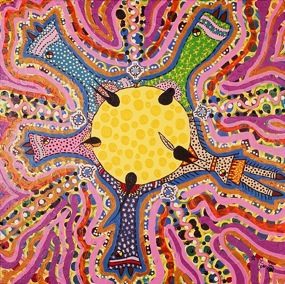See a photo of Annie, her bio, and Part 1 of this Q&A.
Q&A with Annie Hart, Questions 2 and 3:
Q: How did you initially become involved with story/storytelling/narrative? What attracted you to this field? What do you love about it?
A: My mother tells the story of how would take me out to the woods as a little girl and she would put me on a fallen tree stump and listen while I told her stories! This was my first form of theater. I had no idea that I was a storyteller; it was just a natural way of being for me.
Then years ago when I was applying for an apprenticeship in the expressive arts, my mentor told me that I was a storyteller. I had no idea what she was talking about. Later I realized that I thought and spoke in story, very much as indigenous people do. I chose storytelling as the focus for that training and I studied storytellers for a few years to learn about it. I had no idea that I was destined to be a storyteller or that I would end up using story in my career. For me storytelling is more of a worldview and a way of being than a form of speaking. It’s in the being and the bones, not just in the telling.
What do I LOVE about story? Everything! I live for stories. I love story’s power to express that, which is inexpressible. I love its ability to create deep and lasting change. I love seeing how people come alive through story and how it connects us and creates bridges across our human divide. But most of all I love the magic that story creates. When I tell stories I can almost see the magic happening in the room. Stories take us into other beautiful worlds and for a time we can forget about all our cares. I know of no other form of expression that moves us and hits our human bedrock as deeply as story does.
Storytelling is the greatest and oldest power in the world for transmitting wisdom and oral teachings. I am most fortunate that story is my medium for change.
Q: The storytelling movement seems to be growing explosively. Why now? What is it about this moment in human history and culture that makes storytelling so resonant with so many people right now?
A: The indigenous peoples from every tradition, had a prophecy that this would be a time of great change. They literally had that recorded in their stories and their calendars of this time. They are in agreement that this time has finally come and that it is up to us to create a new future. And how else do you create a new future but by using story? Stories create our cultural paradigms, the norms by which we live. If you think about it the world is built on stories. That is why I believe the time is now and that we need stories more than ever. We need a new story to live by.
It’s intriguing to me that storytelling is spreading like wildfire in the area of business, particularly for use in marketing. Storytellers have always known its power, but finally the rest of the world is catching on. Savvy media gurus have come to realize that storytelling is the quickest and most relevant way to share information. Its ability to cross cultures and to spread ideas and information is unparalleled. The time for story has truly come.
The last reason for storytelling being so relevant in today’s world is because everything is speeding up. Everything is quicker, especially communication. Just look at Twitter for example. It’s basically a medium for a 140-character story. In today’s faster paced time, storytelling is essential because captures the listener. It is the deepest and most lasting form of communication known to humankind.


